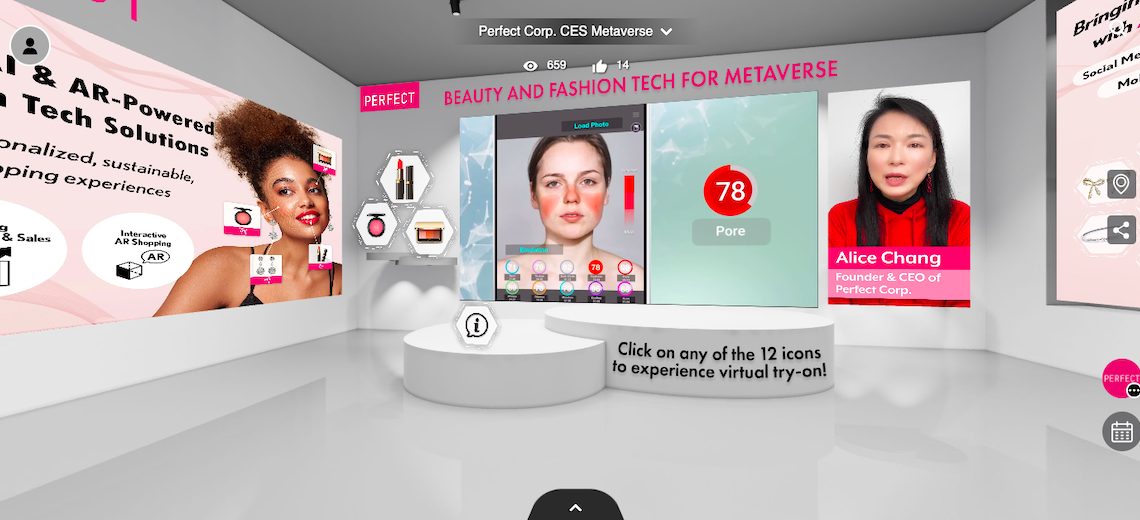While CES’s anticipated IRL comeback has been muted by pandemic-driven cancelations, beauty is still present this year both in Las Vegas and the metaverse.
Taking place from January 5-7 both in-person and virtually this year, CES faced a wave of in-person booth cancellations by major companies such as Amazon and Procter & Gamble when Covid-19 cases started spiking. In beauty and personal care, brands opting out of Las Vegas were prepared with virtual experiences to showcase their new launches. While futuristic beauty devices continue to have a big presence at the event, virtual beauty also continues to take off, especially when it comes to the metaverse.
“As a leader in providing AI- and AR-powered digital experiences, we’re well-equipped to mimic the in-person feel of CES for attendees at home with the interactive virtual booth experience,” said Alice Chang, CEO and founder of Perfect Corp, who decided to take the company’s CES booth virtual due to the pandemic.
Perfect Corp set up a metaverse-style virtual booth to exhibit its new developments, which include expansions in AR try-on tools, as well as a foray into the metaverse and NFTs. Visitors to the online booth can live chat with company representatives to learn more about its announcements.
Perfect Corp’s new virtual try-on tools highlighted include a new foundation-matching tool, video chat AR makeup application and jewelry try-on. The company is also the latest in the beauty tech world to get into the NFT craze. It announced it plans to incorporate beauty and fashion NFTs into virtual try-on experiences, and work with brands to create NFTs for AR.
“Immersive brand experiences and NFTs in the metaverse will be essential for beauty brands to forge meaningful connections with their consumer base,” said Chang. “Much like AR and AI, virtual try-on technologies have become essential to drive customer engagement; engaging experiences in the AR metaverse will become equally as important for beauty brands.”
Procter & Gamble went fully virtual with its CES booth, as well. Similar to its presentation last year, the company is hosting a virtual booth dubbed LifeLab, complete with video game-style navigation. Attendees can virtually walk up to representatives from brands such as Gillette and Oral-B to chat with them.
Ad position: web_incontent_pos1
Procter & Gamble also launched its BeautySPHERE metaverse experience in partnership with London’s Royal Botanic Gardens. Users can walk through a gamified virtual tour of the gardens to learn about ingredients and the company’s sustainability initiatives.

“Facebook’s rename to Meta has created the metaverse frenzy as you see it today, but I have been working through what this could be for quite some time,” said Alexis Schrimpf, vp of design, skin and personal care, and co-founder and chief design officer for SeeMe Beauty at Procter & Gamble. “Our brands have been on a journey in digital for many years,” with a wide range of immersive virtual experiences that predate the “metaverse” label, she said.
Following the theme of high-tech devices from previous years, beauty and personal care gadgets continued to roll out in 2022. Among major conglomerates, L’Oréal unveiled an at-home hair dye device, while Oral-B revealed several new oral-care products. In the startup space, Ninu introduced a “smart perfume” handheld device to create a personalized fragrance with connection to a smartphone app.
Fresh off of a successful first funding round, Beautigloo co-founder and CEO Clara Lizier flew from Paris to Las Vegas to present the brand’s new launches at CES. A member of L’Oréal’s and LVMH’s accelerators, Beautigloo introduced a new beauty fridge with an intelligent thermal system to keep the temperature and humidity constant. It also revealed a patented cryo-stick able to cool in five minutes. The brand opted to keep its physical booth despite the lower crowd numbers.
Ad position: web_incontent_pos2
“We [planned to] have an event with retailers and distributors just before CES’ opening. It has been canceled because of the pandemic. A lot of buyers and retailers couldn’t come,” said Lizier. She plans to rely more heavily on a virtual presentation and the CES app to chat with potential clients, buyers and retailers.
Oral-B, meanwhile, virtually launched its new electric toothbrush models with high-tech digital features. In the pilot phase is a phone camera attachment to examine teeth, while it also unveiled its newest models of electric toothbrushes. Its iO10 connected toothbrush model comes with Bluetooth-linked notifications on its charger, giving users feedback on the time and pressure of their brushing, while pointing out if they miss a spot. The data syncs to the Oral-B app, which they can share with their dentist. When users have successfully brushed correctly, the charger lights up with celebratory lights to encourage people to keep up the good work.
”We have data showing that people actually brush longer and more often because, believe it or not, they look forward to [that reward],” said Sherrie Kinderdine, an R&D group head for Oral-B and Crest.
Overall, brands said they see value in participating in CES, even without as many people on the physical showroom floor in Las Vegas.
“Of course, there will be less opportunities, but we will do our best to reach our goals and also to be more visible,” said Lizier.


